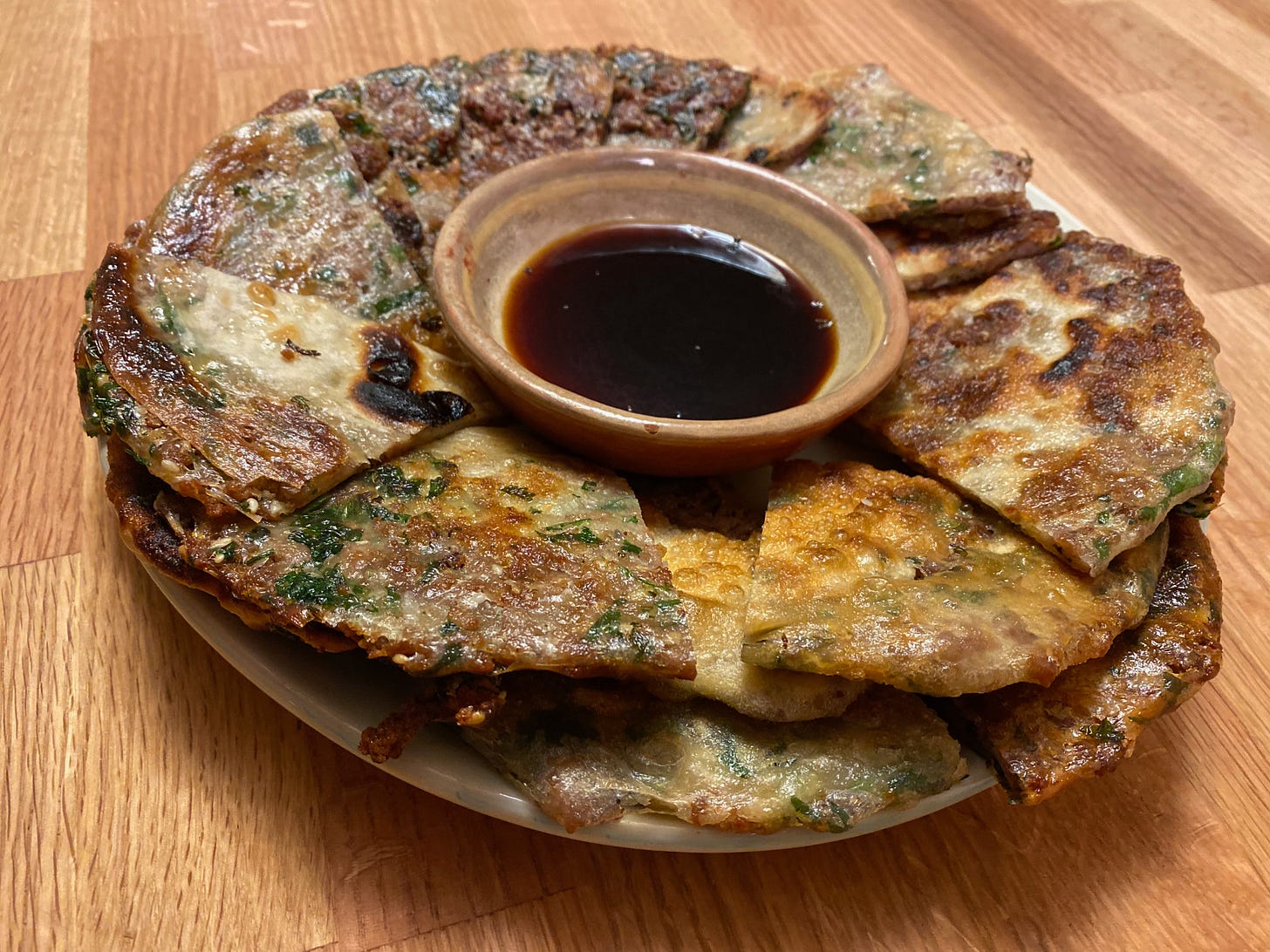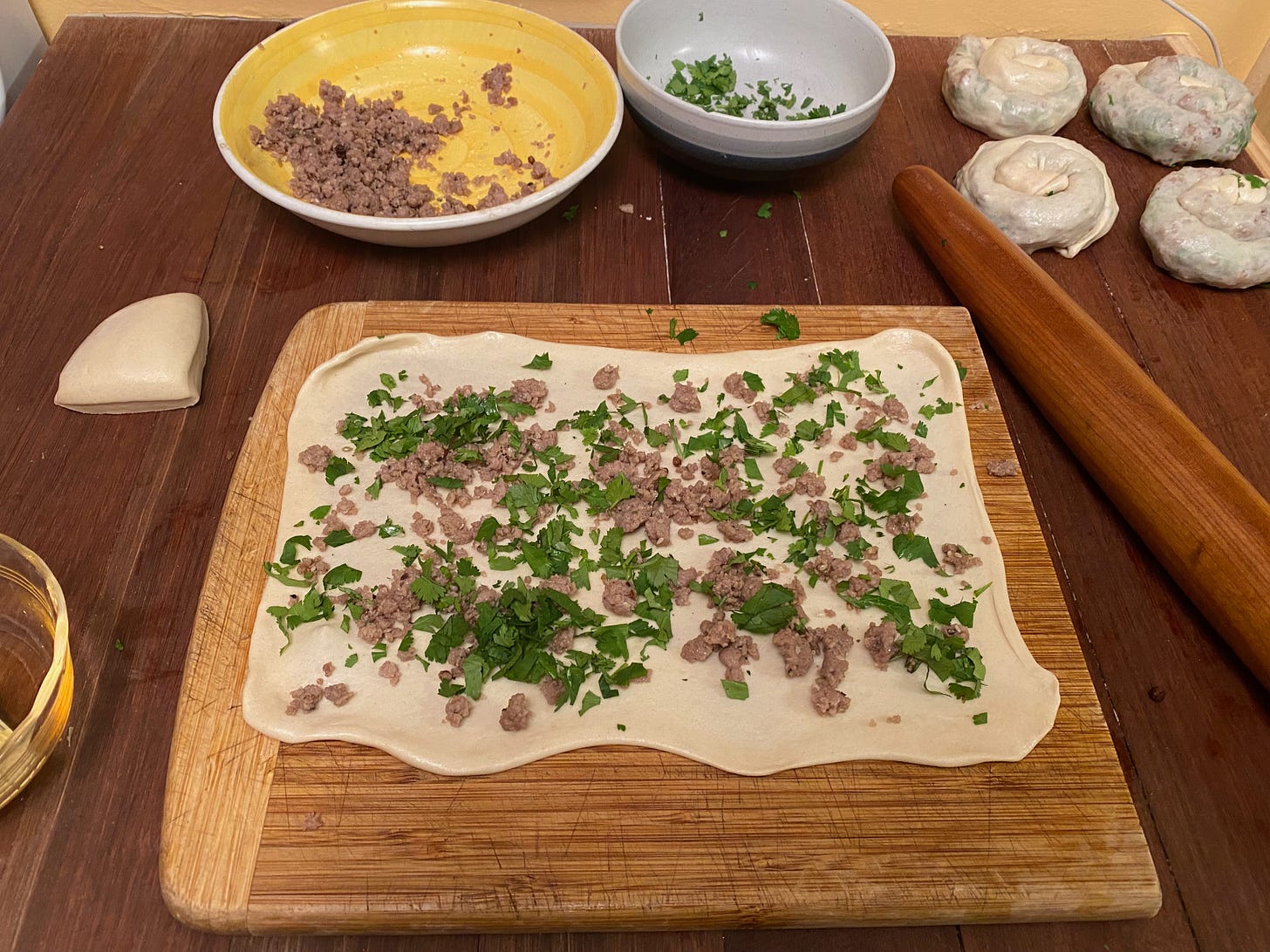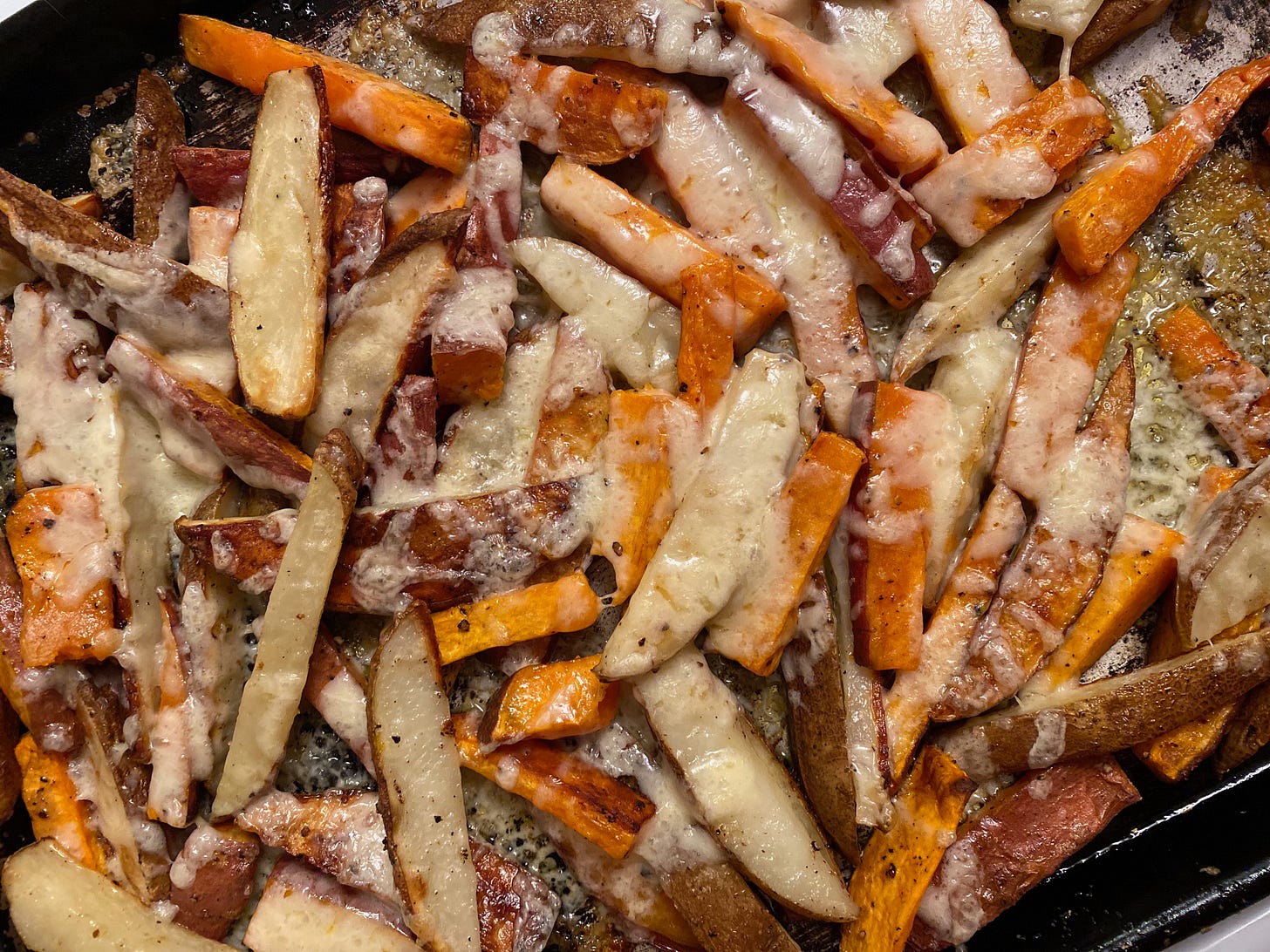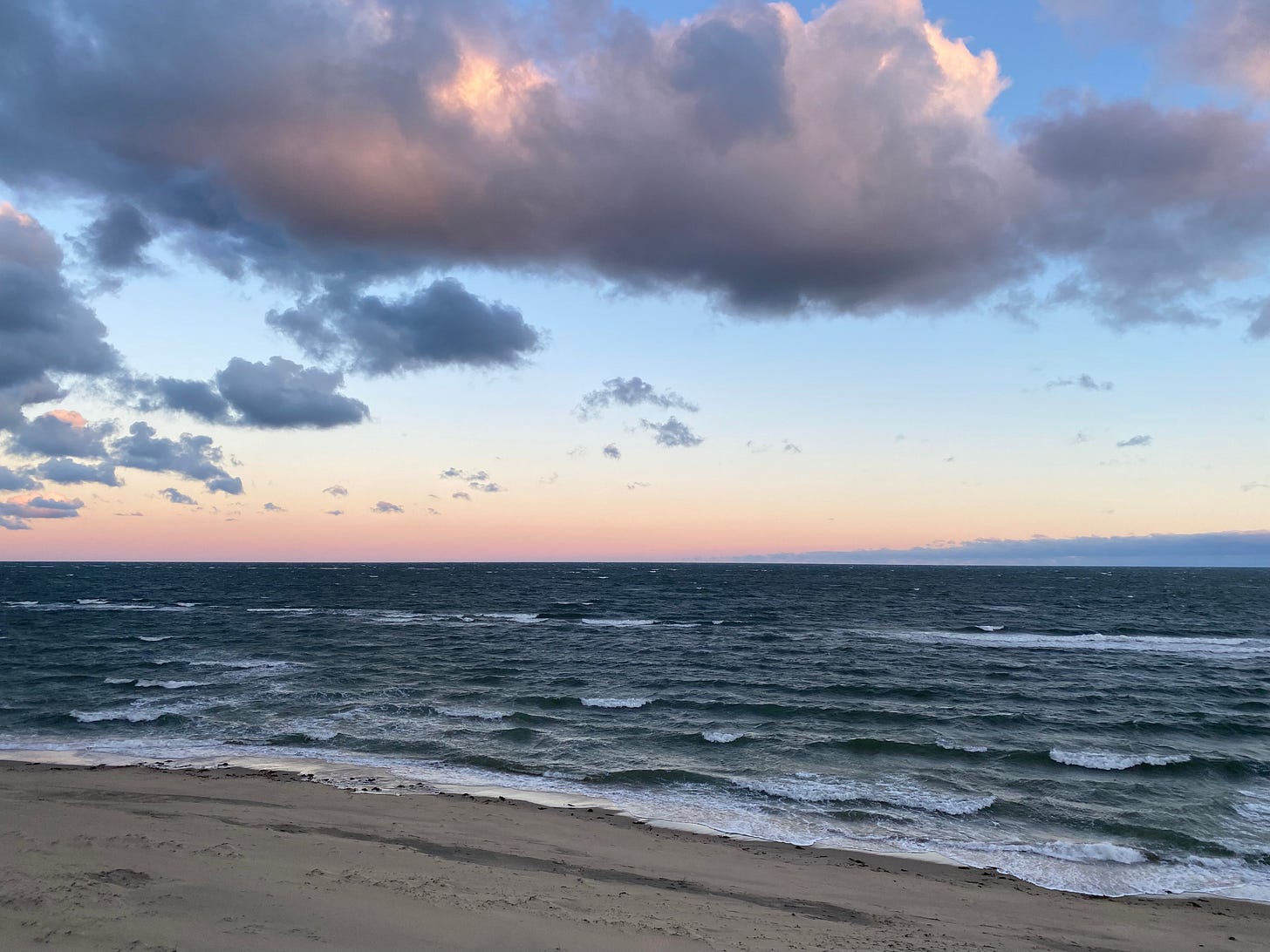Volume 1, No. 36: The Long Haul + Crispy Pork & Cilantro Pancakes
Greetings, bookish friends! Cookie Extravaganza starts in less than two weeks and I’m counting down the days. I’m also counting down the days until I put up my Christmas tree (November 26th). I know what brings me joy, and I don’t fool around with it. Adulthood has its perks.
This week, I’m talking books that are long hauls. Long books. Hard books. Books that take place over dozens of years. Books that catalogue how much, and sometimes how slowly, we all change. Books about journeys that go on and on and on. Books about long-term relationships: with family, with writing, with ourselves. Books that are worth slowing down for, and savoring.
The Books
Backlist: Black Leopard, Red Wolf by Marlon James (Fantasy)
This novel is a long haul in just about every sense: it’s over 600 pages, it has a complex storyline, and it is brutal. It’s not going to be for everyone. It’s not the kind of book I usually recommend because it is so specific, it requires a specific kind of reader. You have to be prepared to read through a lot of graphic violence and rape. You have to be willing to get a little lost. You have to be willing to let the words and the story and the world wash over you.
It’s set in a fantasy world that mirrors the violence of our world. It’s homophobic and patriarchal and often feels claustrophobic and exhausting. A lot of bad things happen to the characters. There aren’t a lot of moments of levity, there aren’t a lot of breaks. Though, when they come, the moments of joy and connection and love are breathtaking. It’s a story about a man desperately trying to be his own person, to live life on his own terms, to love fully, with all of himself. It’s nearly impossible because of the brutality of the world around him. But he keeps trying.
There is a structure to it: Tracker, our main character, is known for his extraordinary sense of smell. He sets out to find a missing boy who disappeared three years ago. He meets a series of people on this journey including the shape-shifting Black Leopard. There is a quest, and things happen, and I didn’t want to stop reading (even though I did, because none of this is easy), but all the adventure and mystery is really just a vessel. Really, this book is stories upon stories upon stories. It’s circular and wild, full of layers. One story morphs into another into another. None of them are simple. They merge and overlap and redouble back on themselves.
I’m going to keep this review short, mostly because I went into this book knowing almost nothing about it, and that served me well. But I will take a moment to praise the audiobook, narrated by the ever-incredible Dion Graham. His performance is so nuanced and alive, as complex and twisting and gorgeous as the novel itself. His voice makes everything more: the brutality, the violence, the tenderness. James's world comes vividly awake. There are good audiobooks, and great audiobooks, and then there are those rare audiobooks that just get it so perfectly that I can’t imagine having read the book in print. This is one of those.
I’m not always up for a challenge, especially in a fantasy novel. But I think this one is worth it. Sometimes authors ask a lot of their readers, and they should. Sometimes it’s worth not just getting lost in a book, but having to really work for it. Sometimes a long haul pays off.
Frontlist: The Spectacular by Zoe Whittall (Contemporary Fiction)
This dual POV novel is about a long-haul relationship. The term “long-term relationship” seems to have gone out of style, and I don’t miss it. It’s telling, though, that when people do talk about having long-term relationships, they’re almost always referring to a romantic partnership. We love to exalt romance above all other kinds of love (I’m so over it), but there are so many other kinds of relationships that unfold over years and years. This dual POV novel is about a mother-daughter relationship. There are lots and lots of books out there about mothers and daughters. What makes this one particularly good is the space it creates. Time is such a major player. The central relationship changes drastically, and it’s mostly because time passes. It’s a tricky thing to make work in a novel, but Whittall pulls it off.
The novel opens with 22-year-old Missy on tour with her rock band. She grew up on a commune in Vermont, founded by her parents and another couple. Her mom, Carola, left the commune when Missy was a kid, suddenly vanishing from her life. Now, at the beginning of her successful career, Missy rarely thinks about her mother at all. Her life is a heady mix of music, drugs, and sex. The story moves around in time from there. It eventually lands in Carola’s POV. She now works at a retreat center in New Hampshire, is married again, and lives a quiet, peaceful life in small cabin with their dogs and cats.
Most of the book is about these two women’s separate lives. It moves from moment to moment. We see Missy’s wild young adulthood, and then we see her later, married, settled, thinking about wanting kids for the first time in her life. We see flashbacks of Missy’s childhood from her POV, and then we see those same years from Carola’s POV. We see Carola as an impulsive young woman, we see the hurt she causes Missy, and we see why. We see her in middle age, settled and in love and able to see herself clearly. Missy and Carola come back to each other slowly, over decades, in bits and pieces, here and there. It’s subtle. They each have their own reckoning to do. They’re on their own journeys. They have not been kind to each other. But as they age, they start to see each other — not as mother, daughter, abandoned, abandoner — but as whole people. And that’s when their relationship finally changes.
There are so many contradictions in this novel. Missy, in her twenties, is fiercely opposed to having children. She never, ever wants them, and she knows it, and the fact that no one really believes her fills her with rage. Later, though, in her late thirties, she becomes obsessed with the idea of becoming a mother. A part of me wanted to hate this, because I know what it’s like to not what children and not be taken seriously. But I also know what it’s like to be sure of something, and then to be sure of something else. This book takes place over so many years. Life is long. Sometimes you’re sure about something, and then you’re not. Sometimes a desire shocks you, comes out of nowhere. Sometimes we surprise ourselves. Whittall is so good at capturing all of these shifts in her characters. She never takes the easy way out.
She handles queerness in a similar way. Missy, in her twenties, has sex with a lot of men. She has one queer experience, vaguely thinks “oh, maybe I’m bi”, and then sort of forgets about it until she’s much older. Carola has a different but similarly quiet relationship to queerness. I found myself wanting both characters to face themselves in ways they often didn’t. I wanted them to make proclamations, to claim their queer identities. But again, Whittall doesn’t take the easy way out. She doesn’t lay it all out neatly. She lets her characters ignore parts of themselves. She lets things simmer under the surface. Missy and Carola have experiences that Whittall relates without commentary, without assigning them meaning, until — weeks or months or years later — they come around to look at them head on.
This is not a flashy novel. It’s about aging, womanhood, forgiveness, music, family-making, and motherhood. Mostly, though, it’s about time: what we do with it, and how it changes us.
Upcoming: I Came All This Way to Meet You by Jami Attenberg (Memoir, Ecco Press, 1/11)
I've only read one of Attenberg's novels, which I liked fine, although I can remember anything about it now and have never been inspired to pick up another one. I’m not sure why I was drawn to this memoir, given that I feel no particular attachment to her writing at all, but I’m so glad I did. I loved this book.
There’s a lot of beautiful and smart observations about writing in this, both writing itself, the art of it, and being a writer, the business of it But it’s mostly about the grind, the long, hard, sweaty, lonely, exhausting, confusing work of growing into yourself. Even the prose feels winding, full of long, twisted sentences that go on and on and on, commas everywhere, strings of ands, a sort of languid but relentless momentum. They pull at you, all of those sentences. There’s an unrefined honesty in them. It’s clear Attenberg is a good writer; the book has flow and shape. But it’s not flashy. Her voice comes through loudly: sad, wry, tired, confident. It’s intimate and celebratory. She loves what she loves, and tells us about it:
I love when sentences nudge up against each other, when I notice a word out of order and then put it in its correct spot. I can nearly hear a click when I slot it into place. I love making a sentence more powerful, more dramatic or moving or sad. Or when I make a sentence quiet enough that I can almost hear the sound of my own breath.
Much of the memoir is about being a young writer, about working hard, year after year after year, about moving from place to place, job to job, person to person, a kind of floating, untethered existence. She writes about how long it took her to find any success as a novelist. There are a lot of details stacked up, in a way that feels . The houses she lived in. The cities she ran away from. The months she spent couch surfing. The endless boring jobs she had, the drugs she did, the friends she made and lost.
One thing I especially appreciate is her openness about her life in her thirties and forties, and how messy it was. We expect people to be messy in their twenties. That’s what your twenties are supposed to be about—exploring your identity, trying things out, messing up. The whole idea of "finding yourself" in your twenties sets up this weird expectation that you'll get older and have it all figured out. I do feel more grounded now, in my mid-thirties, than I did in my twenties, but it’s not like I’ve arrived, finished, reached enlightenment.
also against the the idea that women must be partnered to find meaning, that romantic love is the most important kind, that
So much of this book is about that—Attenberg writes about calming down, but she doesn’t suddenly get wise and arrive in the life she'd always dreamed of. She gets wiser slowly, over decades, as she continues struggling and learning and recalibrating and discovering new truths about herself and the world. Here’s something she says about writing that I can’t stop thinking about. There is so much wisdom in this, but it’s not cliched wisdom. Writing isn’t special, she seems to be saying. It’s the sort of realization that you can only come to by living:
I believe that one must arrive at an intersection of hunger and fear to make great art. Hunger to succeed and create something brilliant and special and affecting. Fear that your life will remain just as it is—or worse—forever.
I was so moved by this book. It made me laugh so many times. I underlined so many passages about writing. So much of it spoke to me: everything she has to say about being a woman writer and being a single woman. The differences between loneliness and being alone, the places they blur and the places they separate. The experience of making art—why we do it, how it feels in the body. I’m not planning on reading all of Attenberg’s backlist now. But that’s okay. There is more than one way to enter into, and appreciate, a writer’s work
It’s out January 11, and you can preorder it here.
The Bake
This bake comes straight out of Kristina Cho’s new cookbook Mooncakes and Milk Bread. I bought it for my nephew for his birthday, and after looking through it with him (and making milk bread together), I bought it for myself. This is the only savory bake I’ve made from it so far, and if it’s anything to go by, this cookbook is about to become my new favorite.
Crispy Pork & Cilantro Pancakes
This is adapted, barely, from Mooncakes and Milk Bread by Kristina Cho. The original calls for Chinese sausage; I didn’t have any so I substituted pork. Rolling and shaping the pancakes might look complicated, but it’s actually easy, and very satisfying!
Ingredients:
300 grams (2 1/2 cups) all-purpose flour
1/2 tsp salt
170 grams (3/4 cup) warm water
1/4 cup canola or other neutral oil, plus extra for brushing
1 pound ground pork
1-2 tsp Sichuan peppercorns, lightly crushed (this is not in the original recipe; I added it because I love Sichuan pepper and it was delicious)
2 Tbs toasted sesame oil
1 cup fresh cilantro, finely chopped
Make the dough: Combine the flour, salt, and water in a medium bowl. Mix with a flexible spatula or a pair of chopsticks until a lumpy dough forms. Turn onto a lightly floured surface and knead until the dough becomes a smooth ball, 6-10 minutes. Lightly oil a bowl, plop the dough in, turn to coat, and cover with plastic wrap. Let rest for 30 minutes or up to 8 hours.
Prepare the pancakes: Cook the pork with the Sichuan pepper until just tender; transfer to a bowl.
Divide the dough into six equal pieces. On a lightly oiled wooden cutting board, roll one of the pieces into a roughly 6x10-inch rectangle. Brush with sesame oil, and then scatter some pork and cilantro evenly over the surface. Starting at a long edge, roll the dough into a tight rope, gently pressing out any trapped. Coil the rope into a spiral, tucking one end underneath. Set aside, and repeat with the remaining dough.
Once you’ve formed six spirals, cover them with a kitchen towel and let rest for 15 minutes. This ensures the pancakes roll out easily and evenly, so don’t skip it.
Fry the pancakes: In a heavy-bottomed skillet, heat 1/4 cup canola oil over medium high heat. Flatten one of the dough spirals with your hands, and then roll it into a 6-inch round. You can use the same oiled cutting board. Fry for 1-3 minutes on each side, until golden brown and crispy. It’s okay if some of the filling bursts out; it will still be delicious. Repeat with the remaining pancakes. Cut into wedges and serve warm, with the dipping sauce of your choice. You can also freeze the uncooked pancakes and fry them straight from the freezer.
The Bowl & The Beat
The Bowl: Yes, Cheesy Roasted Potatoes Are a Meal
Sometimes I roast a bunch of potatoes, slather them in cheese, and call it dinner. A long time ago I started roasting all vegetables at 450, which means that even thick potato wedges cook quickly. I often scramble up some eggs to go with this, and then it’s really a meal. Cook a sausage or two and serve it with a salad and it’s a dinner worthy of inviting somebody over for.
Preheat the oven to 450. Slice a few potatoes and one or two medium sweet potatoes into thick wedges or strips. Dump them onto a baking sheet and toss with olive oil, salt, and pepper. Sometimes I threw in some cumin seeds, too. Roast for 30-35 minutes, then flip them (you don’t have to flip every individual piece). Sprinkle plenty of grated cheddar on top, and roast for another 10-15 minutes, until the whole thing is a gooey, crispy, cheesy, golden mess.
The Beat: The Heart is a Lonely Hunter by Carson McCullers, read by Cherry Jones
I just started this and I’m not sure how I feel about it yet. I think I like it a lot. I’ve been reading a lot of disability literature this year, and so reading this novel, published in 1940 and starring a deaf character, is a bit jarring — the language is so outdated. But I’m trying to read this book in its historical context, rather than looking at it through a contemporary lens. I want to understand what McCullers was saying at the time she was saying it. And a lot of what she’s saying feels radical. There’s also so much queer subtext everywhere, and there’s something almost refreshing about it. I read so many new releases; it’s a treat to read something so different, a book that’s forcing me to use my brain in a different way.
The Bookshelf
Around the Internet
On Book Riot, I wrote about how much I love bookish internet friends. For Audiofile, I rounded up three audiobooks that delve into the complexities of sibling relationships.
Now Out
Hurray! Love in the Big City by Sang Young Park is now out! Go forth and find yourself a copy.
The Boost
I have loved following The Indigenous Reading Circle on Instagram, a book club run by two Indigenous bookstagramers, Erin and Dani. They pick a theme for the books they read each year, and next year there are two: short stories and speculative fiction. I read some of the books they highlighted this year (memoirs) and I’m excited to participate more next year!
I also highly recommend checking out their bookshop page, which is full of books by Indigenous authors in tons of genres.
As always, a little bit of beauty to send you on your way: I’m visiting my island this week, and I’ve been reveling in sunrise beach walks.
And that’s it until next week. Catch you then!










